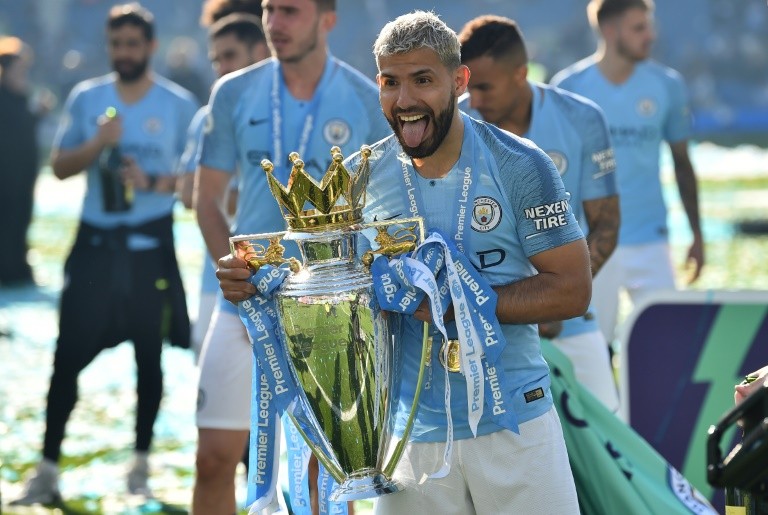Premier League clubs have until Friday to boost their squads but there has so far been little desire for a spending spree from the richest league in the world.
The slump in January spending over the past couple of years shows that the mid-season transfer window is increasingly seen as an undesirable time to do business.
Last year, the total outlay for Premier League clubs in January was £180 million ($234 million) — nearly a third of which was what Chelsea spent on Christian Pulisic, who was loaned back to Borussia Dortmund for the rest of the season.
That was down from a record £430 million splurge in the 2018 mid-season window, when there were a series of big-name moves including Virgil van Dijk, Pierre-Emerick Aubameyang and Aymeric Laporte.
However, the success of those signings has tended to be the exception rather than the rule in a seller’s market in January.
 AFP/File / Glyn KIRKChristian Pulisic joined Chelsea in January 2019 but was loaned back to Borussia Dortmund
AFP/File / Glyn KIRKChristian Pulisic joined Chelsea in January 2019 but was loaned back to Borussia DortmundManchester United are still counting the cost of their lavish outlay on Alexis Sanchez in the same month.
The Chilean is now on loan at Inter Milan, but United are still paying a large part of his wages on a contract with two-and-a-half years left to run.
Read Also: Trump Finally Presenting His Middle East ‘Peace Plan’
Currently fifth in the table, United are desperately in need of reinforcements as they battle to avoid missing out on the riches of Champions League football for a second consecutive year.
– Difficult window –
Ole Gunnar Solskjaer’s already shallow squad has been hugely impacted by injuries to Marcus Rashford, Paul Pogba and Scott McTominay.
 AFP/File / Christof StacheVirgil van Dijk was a big-money signing for Liverpool in January 2018
AFP/File / Christof StacheVirgil van Dijk was a big-money signing for Liverpool in January 2018The club’s executive vice-chairman Ed Woodward has been the target of fans’ frustrations for his handling of transfers over recent years.
United have been in prolonged negotiations with Sporting Lisbon over Portuguese international midfielder Bruno Fernandes, but latest reports suggest the Red Devils are no nearer to completing any deals before Friday’s deadline.
“It is difficult this window — it’s always been. I can’t remember how many good deals that we’ve brought in in January,” said Solskjaer on Tuesday.
“It’s very hard because the clubs don’t want to lose their best players.”
Liverpool’s 16-point lead over Manchester City at the top of the table has lessened the need for either side to bolster their squads for a title fight.
City boss Pep Guardiola has stated for the past few months that his club would not do business in January despite a chance to shore up his defence before the Champions League knockout stages.
 AFP/File / Oli SCARFFAlexis Sanchez struggled after his move from Arsenal to Manchester United in January 2018
AFP/File / Oli SCARFFAlexis Sanchez struggled after his move from Arsenal to Manchester United in January 2018“Normally the players we could think would be interesting to add something for our squad — clubs are not going to sell them in January,” he said.
Liverpool’s romp towards a first league title in 30 years has been built on smart recruitment and they moved quickly to activate a £7 million release clause in Japanese international Takumi Minamino’s contract with Red Bull Salzburg in December.
Other clubs have only been forced into the market by injuries.
Tottenham’s search for a striker to fill in for the absent Harry Kane has seen the Champions League finalists reportedly agree a fee of around £27 million fee with PSV Eindhoven for Steven Bergwijn.
However, for all of the wealth enjoyed by Premier League clubs, for some the well has run dry after a series of bad investments.
Everton and West Ham were among eight English clubs to make the top 20 of Deloitte’s “Football Money League” when it comes to revenue.
Yet Everton posted eye-watering losses of £112 million this month, with cost-cutting needed to avoid breaching the Premier League’s financial fair play rules next year.
West Ham’s perilous position just outside the relegation zone on goal difference is normally one that induces panic buying.
But after a net spend of £214 million on players over the past four years, on Tuesday they announced significant losses for the year to May 31, 2019 and warned of “serious financial consequences” should they be relegated.
AFP

